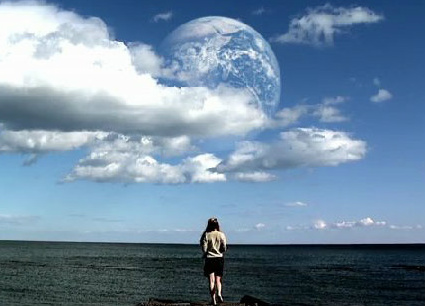Another Earth – Cosmological Conundrum of other selves and other universes

Another Earth
![]()
Another Earth – Mike Cahill
Oddly compelling, this ingenious, absorbing little film was probably made for about the cost of the soft drinks budget on the upcoming Mission Impossible movie. Proof positive that when you have imagination, talent, a clever idea and the commitment to develop it properly, then to film it well, you don’t need CGI, special effects or even Stars (film that is). You do need a distribution deal however, explained here by the fact that this one was picked up by Fox Searchlight plum-picking at the Sundance film Festival where Another Earth attracted a lot of well-deserved attention.
Another Earth’s lead Brit Marling co-wrote with 1st time feature director and long-time collaborator Mike Cahill, and the result is a lean, effective thought-provoking screenplay that crosses genres with a deeply felt, suspenseful emotional drama played out within a sci-fi context more Twilight Zone than Star Wars.
Sensibly Cahill sets Another Earth in and around the familiar territory of New Haven Connecticut where he’s from and his keen sense of place and atmosphere contributes greatly to the overall slightly out-of-kilter tone of the film. Locations and scenes are austerely dressed and shot: interiors look like real lived-in dwellings with crazed old paint and part-bare plaster walls awaiting attention. Marling and her co-lead William Mapother are dressed in down to earth practical clothes with no concessions to glamour or style.
Cahill is also cinematographer and editor which perhaps accounts for the satisfyingly consistent look to the film which with its washed out colours has a cold almost bleak visual tone more Canadian or even Scandinavian than Hollywood gloss. This setting perfectly frames a narrative both morally and emotionally disturbing and complex.
Teenager Roda Williams is beautiful, bright and due to study astrophysics at MIT. Driving home alone after drinking at a party she hears a radio broadcast about a new planet that has appeared in the night sky. Distracted by looking out of the car to try to see this phenomenon she is responsible for a catastrophic car accident that will change her life for ever. She is jailed for 4 years for causing death by dangerous driving and the only surviving victim of her crash is Composer Professor John Burroughs left in a coma for several months unaware that his pregnant wife and young son have perished.
Roda is so overcome with remorse she turns inwards on herself and abandons her ambitions and aspirations. Seeking solitude and personal privacy she takes a job as a janitor at a local high school. Visiting the scene of her accident she sees Burroughs on a similar pilgrimage leaving his dead son’s toy at the site. Roda follows him home. She is driven to trying in some way to communicate her remorse but when Burroughs answers his door to her she panics and pretends to be a house cleaner for a company offering a free trial. At first the reluctant Burroughs, drifting aimlessly through a shattered life, gets her to clear up his long neglected house. They become friends and then lovers over the following weeks.
As a backdrop to this developing relationship, the US scientific organisation SETI (Search for Extra-Terrestrial Intelligence) is stunned to discover that the new planet in the sky is in fact a duplicate Earth inhabited by our other ‘selves’. A scientist making first contact finds herself speaking to someone with the same name and unique personal history. The idea that the lives of the other selves on the other Earth may have taken a different, diverging turn from those on the Earth derives from the well established current cosmological theory of parallel universes. If you feel that Another Earth does not adequately clarify this bewildering idea; just try the real scientists and believe me you will be none the wiser. However as an imaginative device that radically alters our normal intellectual, emotional frame of reference – it works fine.
When a project is mooted to fly a group of people to visit this other earth and perhaps meet their other selves, Roda wins a competition for a seat. We can imagine her desire to see whether the catastrophic instant of time in her life here on earth that destroyed a family and her own life, may perhaps not have occurred in the life of her other self.
Now in love with her, Burroughs begs her not to go. The resolution to these emotional and moral conflicts takes unexpected turns and arrives at a final conclusion that I at least found satisfying and most effective.
Another Earth contents itself with posing questions rather than answering them; asking us to consider extraordinary possibilities and how we might respond to them; questions of morality, emotion, personal identity and responsibility. It does this in an always absorbing and intriguing way, carefully picking its way around anything specific that would provoke or demand our incredulity, which is perhaps the supreme achievement of such an ambitious movie.
Evocatively shot, beautifully and expertly edited, Another Earth draws powerful performances from Marling, more striking than beautiful; and a bluff, no-nonsense Mapother. An original score by Fall On Your Sword music duo Will Bates and Phil Mossman ably sustains the narrative arc of the film.
An unusual, inventive, thought-provoking and thoroughly assured piece of film-making. Recommended.
Filed under: Uncategorized

